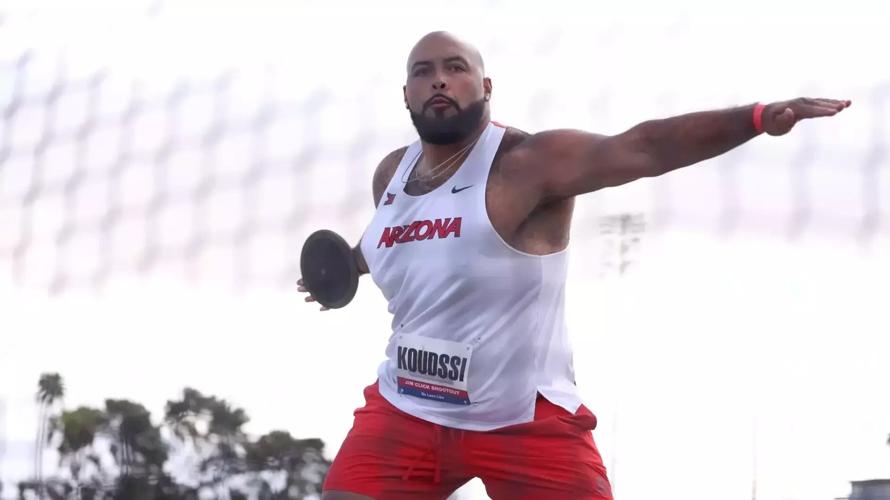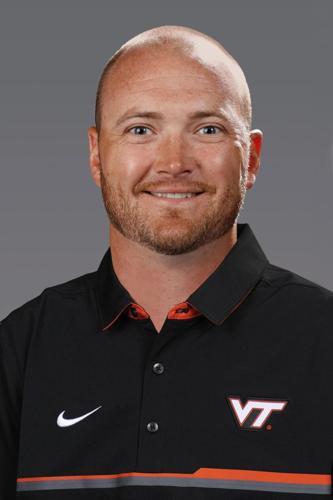A day after he was hired to become ArizonaŌĆÖs new track and field coach Monday, Andrew Dubs was ready to go.
Not because he arrived in Tucson. There was no time for that. It happened when he arrived in Eugene, Oregon, for the NCAA Outdoor Championships.
ŌĆ£Showed up to my room yesterday and had a box of Arizona gear, so IŌĆÖm ready to roll,ŌĆØ Dubs said. ŌĆ£IŌĆÖm just really excited to be a fan and let these athletes really have a great week. IŌĆÖm excited to watch.ŌĆØ

Dubs
But of course, heŌĆÖs going to be doing much more than that. Dubs wonŌĆÖt be coaching the Arizona athletes yet but said he would be watching them, cheering them and begin holding meetings.
During a Zoom call with two Arizona media members and multiple UA staffers Wednesday, Dubs said the previous 48 hours had been a whirlwind and he hadnŌĆÖt had a chance to dig too far into what assistant coaches he might add or retain.
People are also reading…
ŌĆ£IŌĆÖve met with some of the current staff already and weŌĆÖll meet with them throughout the week,ŌĆØ Dubs said. ŌĆ£I donŌĆÖt want to be a distraction to them while weŌĆÖre here, so itŌĆÖs kind of just behind the scenes, whenever they have a free minute ŌĆö even if itŌĆÖs at midnight when the meetŌĆÖs over, IŌĆÖm available to them to meet. But eventually we will meet with everybody.ŌĆØ
A standout thrower at UConn in the early 2000s who has made five previous college coaching stops, including a 2017-2024 stint at Virginia Tech, Dubs said he already knew UA throws coach Lucais MacKay but wanted to get to know other staffers in the week ahead so he could ŌĆ£figure out what the best fit for Arizona is moving forward.ŌĆØ
While Dubs said he wasnŌĆÖt sure yet who would be coaching the individual events, one of them wonŌĆÖt be him: While DubsŌĆÖ background as an athlete and coach is in throwing events, he said he envisioned his role at Arizona would strictly be on the administrative side.
He said he first saw the value in such a role after he began a seven-year stint at Virginia Tech in 2017, working under Dave Cianelli, whom Dubs said managed the program and supported his assistants.
ŌĆ£I had never seen that before, and I was kind of confused, like, ŌĆśHow does this work?ŌĆÖŌĆØ said Dubs, who served as Virginia TechŌĆÖs associate head coach for womenŌĆÖs events. ŌĆ£Usually head coaches coach an event area. What I learned in my time at Virginia Tech is when you have a director who just is kind of managing and being the CEO running the program, it allows the coaches in the event areas to kind of just focus on the student-athletes and have a lot less ancillary responsibility.
ŌĆ£I enjoy the administrative side of the sport, kind of putting the pieces of the puzzle together. I really enjoy that.ŌĆØ
Arizona AD Desire├® Reed-Francois, who was deputy AD at Virginia Tech from 2014-17, said she also found the formula worked under Cianelli.
ŌĆ£We used to call him ŌĆśThe Wizard,ŌĆÖ because he would always figure out a way to win ACC championships, and didnŌĆÖt have the biggest budget in Virginia at the time,ŌĆØ Reed-Francois said. ŌĆ£We did not have an indoor track facility like they do now, but he always won the ACC championship.
ŌĆ£I loved watching how he would assemble a roster. I just thought it was a fascinating process. I liked that modern model that he had adapted.ŌĆØ
Reed-Francois said she also relied heavily on an internal search committee that included several UA associate ADs and special assistant Mike Candrea, in identifying Dubs as the choice to replace Harvey.
Dubs said he would continue to serve as USAŌĆÖs head coach in the World University Games in July, keeping a role heŌĆÖs also held for the past five years, while also moving ahead with his Arizona duties.
While Dubs said the history of throws ŌĆ£has been phenomenal at Arizona,ŌĆØ and vowed to keep that area of the program at a high level, he said cross-country and distance would be a top focus.

Youssef Koudssi took first in menŌĆÖs discus on Day 1 of the Jim Click Shootout, April 4, 2025.
ŌĆ£You go back historically and look in the ŌĆś80s and the ŌĆś90s and early 2000s and Arizona had very high level distance programs and cross country programs,ŌĆØ Dubs said. ŌĆ£ThatŌĆÖs something that we want to get right ŌĆ” thatŌĆÖs going to be a big priority.ŌĆØ
Staying competitive in 4x4 relays is among the other priorities, he said.
ŌĆ£I really believe that you have to end every competition with a really competitive and fierce 4x4,ŌĆØ Dubs said. ŌĆ£At every meet, the 4x4 is the last event, and we want to be the last team on the track, so to speak. And with that event group, you can have a really diverse sprints program because everything can bleed off of the four by four ŌĆö the 400, the 200, the 400 hurdles.
ŌĆ£Then weŌĆÖre going to be really competitive in the jumps. WeŌĆÖre going to invest across the board.ŌĆØ
Dubs said he was still learning how the pool of scholarships would work at UA, while he and Reed-Francois expressed optimism that the newly passed House settlement would even out the competitive playing field in track and field recruiting.
Schools are now allowed to pay athletes up to $20.5 million but more than 90% of it is expected to be allocated to football and menŌĆÖs basketball at most schools. (Reed-Francois has declined to specify what ArizonaŌĆÖs revenue sharing allocations will be but Harvey said he expected track and field would receive 7-10%).
ŌĆ£There are challenges. There are so many challenges,ŌĆØ Reed-Francois said. ŌĆ£But you know what? Anything worth doing is not going to be easy. We are not going to cut sports, we have an incredible championship pedigree, our Olympic sports are a source of pride, and we are going to continue to be very good fiscal stewards.ŌĆØ















